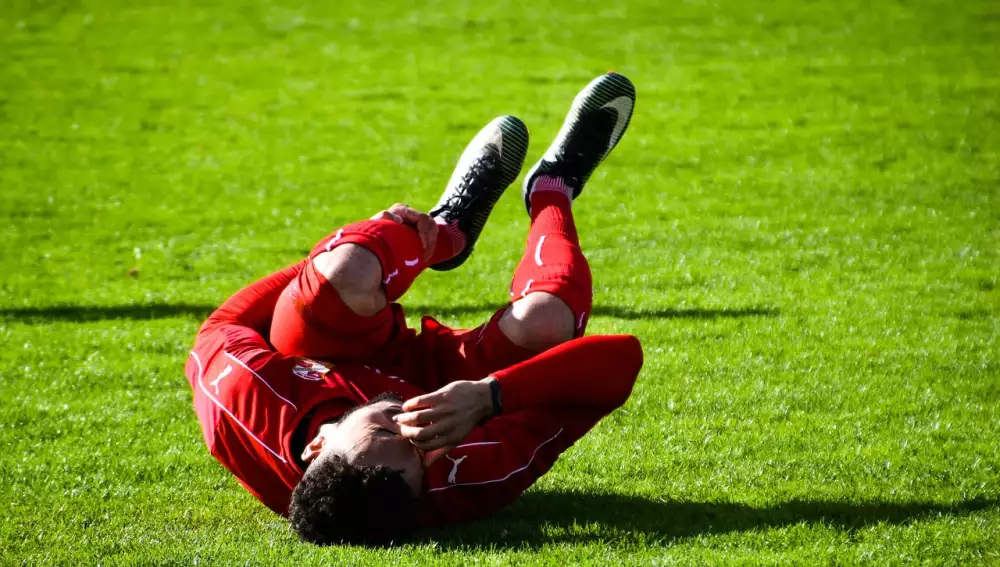Do you recognize the symptoms of muscle fever? Find out how to deal with them!

- What is muscle fever?
- What are the causes of muscle fever?
- What are the main symptoms of muscle fever?
- How does muscle pain manifest itself in muscle fever?
- How long does muscle fever last?
- What are the treatment options for muscle fever?
- How can muscle fever be prevented?
- When is it necessary to seek medical attention for muscle fever?
- What are the recommendations for the prevention of muscle fever?
- How is muscle soreness different from other muscle problems?
- What is the latest knowledge about muscle fever?
- Stories of people who have dealt with muscle fever.
What is muscle fever?
Muscle fever, also known as myalgia, is a condition characterized by muscle pain and stiffness that usually occurs several hours or days after intense physical activity. Symptoms of muscle fever can include muscle pain, swelling, fatigue and reduced mobility. In some cases, it may be more likely in people who are new to exercise or when the intensity of exercise increases suddenly. There are a number of methods to relieve the symptoms of muscle fever including non-steroidal anti-inflammatory drugs (NSAIDs), heat and cold packs and distraction activities. It is also important to ensure the body gets enough rest and hydration after physical activity.
What are the causes of muscle fever?
Muscle fever is a painful condition that can be caused by a variety of factors. One of the main causes is excessive physical activity, especially during high-intensity exercise or sports activities. Overexertion of the muscles can lead to micro tears in the muscles and subsequent inflammation, causing pain and muscle fever.
Another cause of muscle fever can be infections such as colds, flu or other viral illnesses. These conditions can stimulate the body's immune system to produce cytokines, which are the substances that lead to muscle pain and fever.
People with sedentary lifestyles in particular may also experience difficulties due to fatigue and stress. Prolonged stress can lead to changes in the body's hormonal system and lower levels of certain hormones that help maintain muscle tone and regulate fatigue states.
In any case, it is important to protect your muscles and take a gradual approach to exercise and sports to avoid overuse and the risk of muscle soreness.
What are the main symptoms of muscle fever?
Muscle fever, also known as Delayed Onset Muscle Soreness (DOMS), is an uncomfortable condition that can occur hours to days after intense exercise. The main symptoms of muscle fever are muscle pain, stiffness and reduced joint mobility of the affected muscles. These symptoms may be accompanied by swelling and redness in the area of the affected muscles. They usually last for 24-72 hours and can limit an individual's ability to fully manage daily activities. It is important to avoid excessive exercise and to perform adequate stretching and recovery after intense training activities to minimize the risk of developing muscle fever.
How does muscle pain manifest itself in muscle fever?
In muscle fever, muscle pain manifests itself in a very unusual way. It usually appears a few hours after the muscle has been strained and can last for several days. The muscles are stiff, tense and sensitive to touch. Fatigue and a general feeling of malaise are also often observed. Muscle pain may worsen with movement and in some cases joint movements may be restricted. If muscle fever is suspected, it is advisable to seek medical attention and rest.
How long does muscle fever last?
Muscle fever is a condition that can be caused by muscle overload after intense physical exercise. This condition can include muscle pain, fatigue and weakness. It usually lasts for a few days, but in some cases can last up to a week. It is important to remember that muscle fever is a normal response of the body to exercise and does not need to be treated. However, in order to minimize the chances of developing muscle fever, it is important to gradually increase the intensity and duration of exercise and follow proper exercise technique.
What are the treatment options for muscle fever?
Muscle fever can be an unpleasant symptom after strenuous physical activity. If you experience muscle fever, don't despair. There are several treatment options that can help relieve your symptoms and speed up the healing process.
One of the most natural forms of treatment is rest and hydration. After exertion, the body needs time to recover, so take a few days off from exercise and try to drink plenty of fluids.
Another option is anti-inflammatory medication, such as ibuprofen or aspirin, which can reduce pain and swelling. However, always check with your doctor before taking any medication.
In addition, you can try to relieve the pain by using heat and cold. Warm compresses on sore muscles can help relieve tension, while cold compresses reduce swelling.
A final tip to relieve the symptoms of muscle soreness is massage. Burning in the muscles can be successfully targeted with muscle massage, which will improve blood circulation and help bring relief.
Try a few of these methods and see what works best for you. However, if the pain or swelling persists for more than a few days, it is always best to consult a doctor.
How can muscle fever be prevented?
Muscle fever, also known as myalgia or myositis, can be a painful and unpleasant experience for athletes and everyday people after intense exercise. This condition is caused by excessive training or activity that the body is not used to performing. To avoid muscle fever, it is important to be aware of your limits and gradually increase the intensity of your training.
It is also important to ensure that the body is adequately hydrated during and after exercise. It is recommended to drink at least 2 litres of water per day.
A suitable warm-up programme should be performed before training to improve blood flow in the muscle tissues and reduce the risk of muscle soreness.
For easier muscle recovery, consumption of protein-rich foods is recommended. For example, lean meat, fish or eggs are suitable.
In case of muscle fever, it is necessary to stop excessive activity and allow the body enough rest and regeneration. Alternatively, anti-inflammatory drugs and the use of ice packs can be tried to relieve pain.
It is important to remember that muscle soreness is a natural process in increasing physical fitness. However, following proper training procedures and taking proper care of the body can help minimize the risk of developing this condition.
When is it necessary to seek medical attention for muscle fever?
Muscle fever, also known as myalgia, can be caused by a number of factors such as intense exercise, infection and inflammatory diseases. In most cases, these are mild symptoms that can be relieved by soothing the muscles and resting. However, there are situations where it is necessary to seek medical attention. If the pain occurs over a long period of time and does not subside with rest or changes in body position, it could be a sign of serious muscle damage. Also, if the pain is combined with fever or other unusual symptoms, such as swelling or bleeding, this could indicate further medical intervention. If uncertain, it is always best to consult a doctor or sports medicine specialist.
What are the recommendations for the prevention of muscle fever?
Prevention of muscle fever is key to minimizing its occurrence. It is recommended to engage in training gradually and sensibly, not increasing intensity too quickly and ensuring adequate recovery. It is also important to ensure you get enough sleep and hydration during exercise. We recommend using the right equipment and technique when training, which reduces the risk of injury and muscle overload. It is also important to monitor your body and not hesitate to consult a doctor or trainer if you experience any pain.
How is muscle soreness different from other muscle problems?
Muscle fever is a condition that can occur in people after intense physical activity, especially during high-intensity exercise or a new training regimen. It is a type of muscle problem that usually manifests itself with muscle pain, cramps and fatigue in the areas of the body where the most stress has been applied. Unlike other muscle problems, such as cramps or muscle injuries, muscle soreness is characterized by a gradual worsening of symptoms during the first 24 to 48 hours after exercise. This can lead to limited mobility and a reduced ability to perform daily activities. It is important to recognize the differences between different types of muscle problems and understand the symptoms of a particular condition so that the necessary steps can be taken immediately to relieve pain and restore optimal body function.
What is the latest knowledge about muscle fever?
Muscle fever, also known as myalgia, can be a very painful condition that can persist for several days. Recent research suggests that muscle fever arises as a result of microscopic damage to muscle fibres during intense physical activity. These damages cause the release of cytokines and other inflammatory mediators, triggering an inflammatory response and pain. In addition, it has been found that increases in body temperature and excessive sweating can also contribute to the development of muscle fever. Prevention against this unpleasant disease may consist of gradually increasing the intensity of exercise and sufficient muscle recovery through stretching or massage techniques.
Stories of people who have dealt with muscle fever.
The stories of people who have dealt with muscle fever are inspiring and encouraging. One example is an athlete who experienced severe muscle pain and general fatigue after a tough workout. However, thanks to his strong determination, he devised a strategy to recover faster and overcome the muscle strain.
Another story might be a person who works in construction or a similar physically demanding job. After a hard day, she realized that she was feeling severe muscle pain and generally not feeling well. Even though she laid down on her bed and just wanted to rest, she decided to use a pain reliever to ease the symptoms of muscle fever. Today, she knows how a systematic approach to her condition has helped her heal successfully.
These stories show us that there is no need to resign from activity because of muscle fever symptoms. With appropriate prevention and treatment, a successful recovery can be achieved.
Published: 10. 10. 2023
Category: Health



